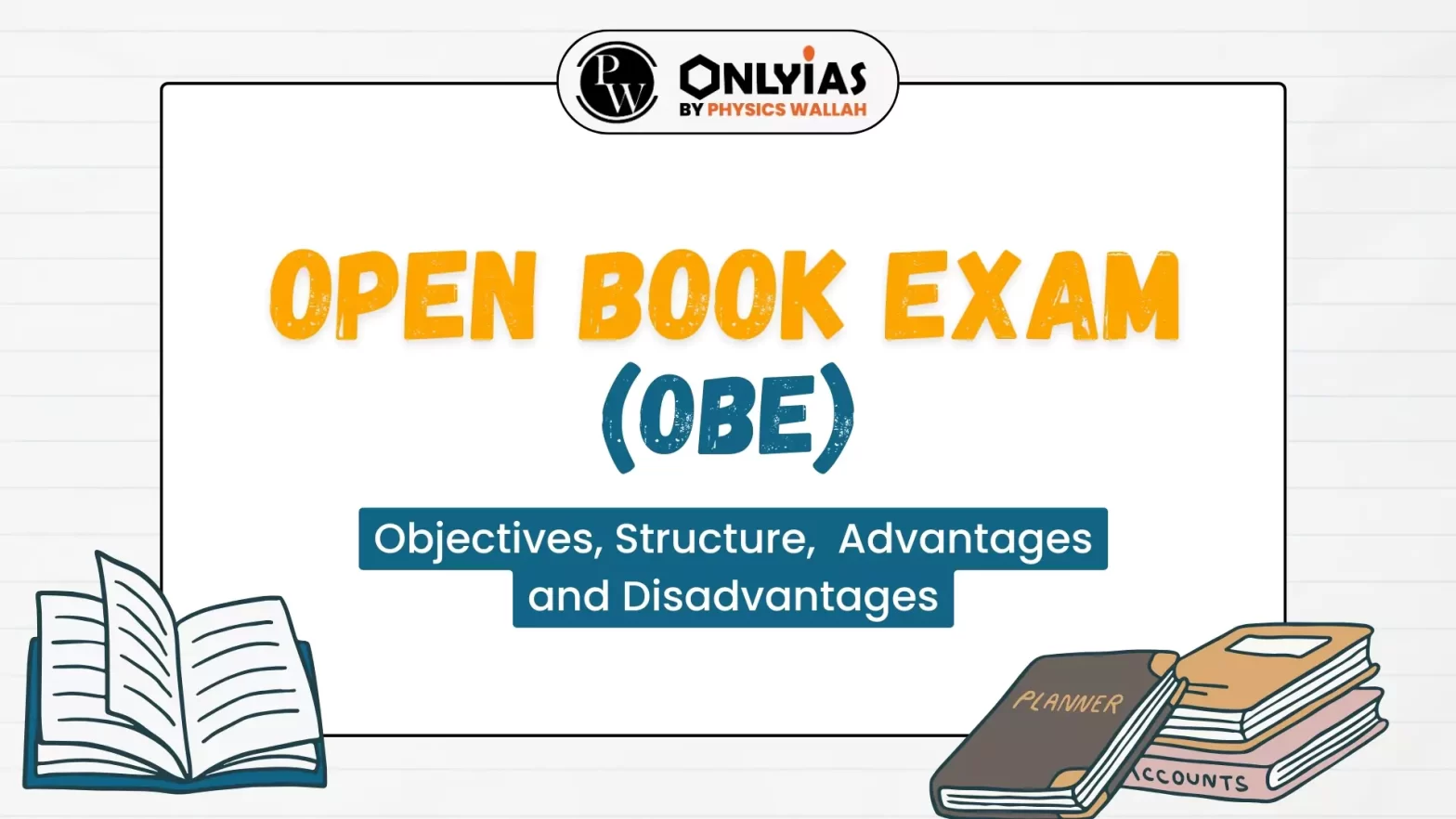Context:
This editorial is based on the news “CBSE open book exam plan: What is it, why now, how it can impact students” which was published in the Indian Express. CBSE is reportedly contemplating Open Book Examinations (OBE) for Classes 9 to 12, aligning with the new National Curriculum Framework.
- To assess the feasibility of OBE, a pilot will be held in select schools for subjects like English, Mathematics and Science for Classes 9 and 10, and English, Mathematics and Biology for Classes 11 and 12.
Enroll now for UPSC Online Course
About Open Book Exam (OBE):
- It refers to an educational approach where students are allowed to use their textbooks, notes, and other reference materials during examinations.
- Aim: to test higher-order thinking skills, application, analysis, critical and creative thinking and problem-solving of the Students.
- Types: It can be either of a:
- Restricted OBE: Only the study material approved by the exam-conducting authority is allowed during the exam
- Free OBE: Students can bring any material they find relevant.
- Structure of Test Questions Within Open Book Exam: In such a manner that enables students to apply concepts, instead of just copying information from the available material.
Open Book Exam From Around the World:
- Law Schools in the United States
- Engineering Exams in Germany
- Medical Schools in Australia.
- Economics Exam in the United Kingdom
|
Also Read: Indian Education System – We need an Education System that Isn’t Held Hostage By Exams
Benefits of Open Book Exam (OBE)
- Encourages Critical Thinking: Open Book Exam puts emphasis on the development of the comprehension, application, and critical thinking of the Students.
- encourages students to analyse and synthesise information rather than simply memorising facts.
- They need to understand the material well enough to apply it in different contexts
- Promotes a deeper level of learning: encouraged to understand and delve deep into the concepts.
- Prepares for real world Situations: In professional settings, individuals often have access to resources and references.
- Open Book Exam simulates these real-world situations, helping students develop skills that are directly applicable to their future careers.
- Reduces Stress: Students feel more confident knowing they can refer to their materials if needed.
- Encourages Resource Management Skills: Students learn to efficiently navigate and use reference materials, developing skills in finding relevant information quickly.
- This is a valuable skill in academic and professional settings.
Disadvantages Of Open Book Exam (OBE)
- Challenge for Teachers: to set up questions for an Open Book Examas, unlike a traditional exam, the questions cannot be direct.
- Reduced Motivation to Study: if students know they can bring their materials in an examination..
- may not develop strong memorization or critical thinking skills.
- Inequality among Students: The availability of different resources can create inequality among students.
- Those with better access to high-quality materials may have an advantage over their peers.
- Not an accurate replica of real world situations: Real world situations necessitate quick decision-making and recall of basic information are crucial, such as in emergency or time-sensitive situations.
- Challenge of Time Management: Students may spend too much time searching for information in their materials leading to incomplete or rushed answers.
- Some students may underestimate the level of understanding required and assume they can solely rely on the materials.
- Risk of plagiarism: They may be tempted to copy answers or use unauthorised materials.
- Logistical Challenges: Organizing and administering OBE’s can be difficult for teachers.
- Students must anticipate the types of questions that may be asked and keep the relevant materials accessible.
- They may try to bring too many books into the exam environment.
Not a New Idea in India:
- In 2014, CBSE had introduced an Open Text Based Assessment (OBTA) for students of Class 9 and 11 in selective subjects.
- It was a restrictive OBE: students were allowed to refer to learning material provided to them four months ahead of the exam.
- In 2017-18, the practice was discontinued in the 2017-18: inability to cultivate “critical abilities” among students.
- All India Council for Technical Education (AICTE) in 2019 allowed OBE in engineering colleges.
- Several Central universities like Delhi University, Jamia Millia Islamia, Jawaharlal Nehru University and Aligarh Muslim University conducted an open book test to assess students during the pandemic.
- Kerala’s higher education exam reforms commission recommended the open book format, but only for internal or practical examinations.
|
Need For the CBSE to Propose Open Book Exam (OBE)
- In tandem with National Educational Policy, 2020: No mention of Open Book Exam in the NEP2020.
- But it suggests a transition from rote memorisation to competency-based learning.
- National Curriculum Framework for School Education: It suggests assessments that can:
- accommodate different learning styles of students,
- provide constructive feedback,
- support learning outcomes and
- minimise rote learning.
Enroll now for UPSC Online Classes
Way forward to the Open Book Exam (OBE)
- Need to train students on how to write an open book exam and develop the necessary skills of analysing concepts to get the benefits of Open Book Exam.
- Students should be taught comprehensively all year long so that they can tackle questions analytically.
Also Read: Rethinking India’s Exam-Centric Education System
| Prelims PYQ (2017):
With reference to ‘National Skills Qualification Framework (NSQF)’, which of the statements given below is/are correct?
1. Under NSQF, a learner can acquire the certification for competency only through formal learning.
2. An outcome expected from the implementation of NSQF is the mobility between vocational and general education. Select the correct answer using the code give below:
(a) 1 only
(b) 2 only
(c) Both 1 and 2
(d) Neither 1 nor 2
Ans: (b) |
![]() 24 Feb 2024
24 Feb 2024
